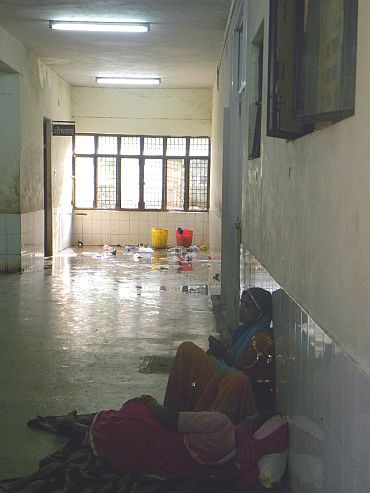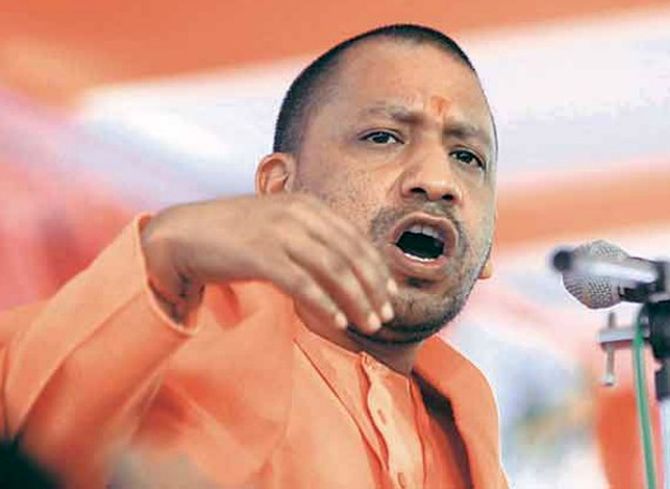There is nothing the young Purvanchali wants more desperately than to escape to a place with less hopelessness, and some opportunity, discovers Shekhar Gupta.

Badlands is one of those familiar Americanisms, like ballpark, Wild West and gentrification that feature in our usage more as malapropisms.
In Uttar Pradesh, many zones vie for that description. Barren, eroded valleys along the Yamuna and Chambal in Bundelkhand and Etawah would match it literally and also in the more popularly understood sense of lawless zones.
Further east, landscape is more lush, fed by more orderly and normal water courses, with fertile banks. But rule of law can decline as fast as quality of life.
Open, overflowing drains, sewers, lose wires overhead, permanent stink in the air, potholes, encroachments, stunted children, sunken-cheeked adults, hundreds killed each year by some scourge labelled Japanese encephalitis.
Whatever goes for sidewalks paved comprehensively with garbage, given a kind of durability because of the amount of plastic waste mixed in it, bottles, plates, bags, wrappers.
Except late night, when -- at least in and around the more 'posh' parts of Gorakhpur, where the new shopping malls, restaurants and the odd spa are to be found -- it is swept and piled, neatly, in the middle of the road.
Gorakhpur is pretty much the capital of eastern and most hopeless zone of UP. There's the open border with Nepal on the north, rougher eastern districts (including Kushinagar, among the most important Buddhist sites) bordering western Bihar, and even more messed up districts of Deoria, Azamgarh, Ballia, Jaunpur etc in the south.
We have long accepted that the northeast is India's forgotten zone, out of sight, out of mind. You can also come to Eastern Uttar Pradesh, especially Gorakhpur for that experience.
You can have two views of Gorakhpur, depending on where you look, downwards or up, terrestrial or aerial.
If under your feet there's just muck, up there, left, right and front at road junctions, is wherewithal to get away from it all.
I have taken note of the boom in private sector higher education, English-medium schools and coaching centres in the heartland for 15 years now. Education emerged as the most popular consumer product in small-town India, post-1991 reform.
In Eastern UP or Purvanchal it has gone to a completely different, unreal level. Hoardings, some the size of Tollywood cinema in Hyderabad, stand wall-to-wall, offering a ticket to a job far away from here.
On a late night walk in and around the Civil Lines area, I counted 200 hoardings of all kinds.
A little over 170 of these were about education, training, coaching for competitive examinations, spoken English classes.
One mocks you in bold Hindi letters: Kya aap samajhte hain aapko angrezi ki zaroorat nahin hai? (do you really think you don't need English skills?).
Another presents to you Dr Rahul Roy, whose PMT coaching has 'already produced 1,012 doctors from Purvanchal in 18 years', a kind of medical equivalent of Patna's famed engineering Super 30.
There is nothing the young Purvanchali wants more desperately than to escape to a place with less hopelessness, and some opportunity.
A few may crack a coveted competition, rest fill up our rotting metro suburbs and slums, pulling rickshaws, providing labour at construction sites, selling fruit and vegetables on hand-carts, running tiny chai shops.
No film-maker would even bother to flatter this forgotten zone of more than 6 crore Indians with something like Udta Purvanchal although its young people mostly have one aspiration: To fly away.
To call Prime Minister Narendra Modi a brilliant orator does no justice to his phenomenal talent at engaging with his audience. He knows what they want to hear, when, and in what tone.
Add to this his gift of timing, pauses, body language with arms waving in a wide arc, a reversed palm slapping the other when he thinks he has made a good point.
You are surprised, therefore, to make that rare discovery: Of a false note in his near-perfect campaign script in Deoria, about 60 km away.
More ironically, it is an error of understanding we have noted Rahul Gandhi making in past campaigns. Like him in the 2012 state election, Modi also spoke of economic migration as the region's curse.
'Don't all of you young people want jobs within your own janpad (taluka) so you don't have to go far away? Which young person doesn't want to live close to his old parents?' He asked these questions and paused, looking for response.
If he was surprised by how muted it was, he also doesn't understand the flight-not-fight desperation of Purvanchalis.
The issue here isn't just education or jobs, but the suboptimal quality of life you are condemned to, way below your means, however modest.
Open drains become canals in the monsoon, you endlessly swallow an air laden with dust and so many mosquitoes that you might swallow a few if you talk on the phone while walking.
The prime minister also read out a passage from the UP government Web site admitting that parts of the state had below sub-Saharan social indicators. It could have been talking about Purvanchal.
Some of the region's curse lies in its geography. Gorakhpur is too far from just about anywhere, and doesn't fall on any of the trunk rail or highway grids in the country.
Until not too long ago, it was still in the metre-gauge zone. Its people were always talented, hardy and rebellious.
The midway stop between Gorakhpur and Deoria is Chauri Chaura, where a mob burnt the police station killing 23 policemen in February 1922 and jolted Mahatma Gandhi into calling off his first non-cooperation movement and go on a fast in penance.
The British declared martial law, and let loose a reign of reprisals and terror. Nehru came to protest, was arrested here, and you wonder how he would have made it to a place so distant now, 94 years later.
In Gorakhpur jail, famous revolutionary Ram Prasad Bismil was hanged. But the region was still too far.
Revolutionaries have now been succeeded by mafiosi.
Those who ran brutal and blood-feuding Brahmin and Rajput mafias are no more. But there are any number of smaller gangs and any time a supari killing takes place in far cities you'd find some usual suspects from hereabouts.
Vishal Bhardwaj's Ishqiya captured this in an unforgettable dialogue between Naseeruddin Shah and Arshad Warsi, who play a felonious uncle-nephew duo on the run, hiding around Gorakhpur.
'Let's get our backsides out of here, maamu (uncle),' says Warsi. 'In our Bhopal only Shias and Sunnis fight. Here Brahmins, Thakurs, Yadavs, Jats all have senas (private armies).'
This is how Purvanchal also passes the test of the popular meaning of the epithet badlands. The reigning sovereign of Gorakhpur isn't a feudal or conventional mafioso.

It's a well-muscled, articulate, saffron-clad baba, Yogi Adityanath, hereditary chief of the powerful Gorakhnath mutt (Which gives Gorakhpur its name).
He's been elected to the Lok Sabha from here five times. His temple and mutt is the most prominent landmark of the region, and also the cleanest.
He gives us an audience in a hall lined with portraits of his ancestors (it's a very long dynasty) with description of which deity or godly trait each one personified.
Why has the BJP not fielded any Muslims in this election? Winability counts, he says, and so what if there are no Muslims in the BJP list, because there are never any communal riots here.
Why so, we ask.
"Because of our fair governance and fear (bhay)," he says.
Why fear, and whose fear, we ask. The question is ignored.
His eyes light up when the idea of splitting UP into smaller states comes up.
One of these would be Purvanchal. This election isn't the time for this, he says, but makes it evident he looks forward to it later and sees himself as its natural chief minister.
With such prospects written on the wall, who wouldn't listen to Arshad Warsi's advice? And get his backside out of here.













 © 2025
© 2025